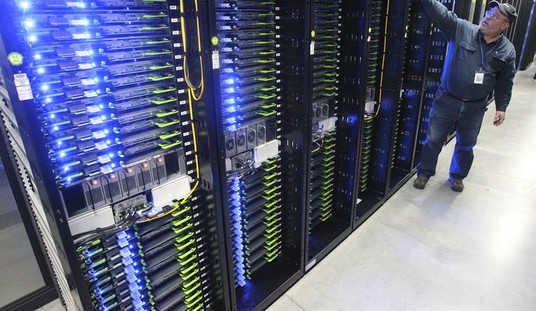We heard from one half of the Watergate-exposing journalistic duo this week on the AP scandal, and now the other half weighs in on the supposedly waning Benghazi debate. The White House released 100 pages of e-mails that went around the administration on 9/14 — but oddly not on 9/12 or 9/13 — less than an hour before Barack Obama gave a speech on the IRS scandal and pushed the e-mails back into the background. Bob Woodward tells Morning Joe that they won’t stay in the background, because it shows an exercise by the White House to keep people from learning the truth about the terrorist attack … and that looks mighty familiar to him:
Via Daniel Halper:
“You were talking earlier about kind of dismissing the Benghazi issue as one that’s just political and the president recently said it’s a sideshow,” said Woodward. “But if you read through all these e-mails, you see that everyone in the government is saying, ‘Oh, let’s not tell the public that terrorists were involved, people connected to al Qaeda. Let’s not tell the public that there were warnings.’ I hate to show, this is one of the documents with the editing that one of the people in the state department said, ‘Oh, let’s not let these things out.’
And I have to go back 40 years to Watergate when Nixon put out his edited transcripts to the conversations, and he personally went through them and said, ‘Oh, let’s not tell this, let’s not show this.’ I would not dismiss Benghazi. It’s a very serious issue. As people keep saying, four people were killed. You look at the hydraulic pressure that was in the system to not tell the truth, and, you know, we use this term and the government uses this term, talking points. Talking points, as we know, are like legal briefs. They’re an argument on one side. What we need to get rid of talking point and they need to put out statements or papers that are truth documents. Okay, this is all we know.”
Some of the administration’s apologists want to focus on how Republicans in Congress misquoted the e-mails to reporters like Stephen Hayes and Jonathan Karl, but they got correct what Woodward points out in this clip. Others say that the White House couldn’t tell the truth because it would have interfered in the investigation. Once again, let’s return to this entry about midway through the e-mail string, which came after concerns about getting ahead of the investigation but before State demanded wholesale changes to the talking points:
As I wrote yesterday:
On Friday evening at 9:43 pm, the CIA acknowledged that ”FBI says AQ (not AQIM) was involved and they are pursuing that theory. So we are not ahead of law enforcement now[,]” referring to an earlier concern that identifying this as a terrorist attack would interfere with the FBI’s investigation of the attack. However, almost immediately thereafter, even the more generic mentions of purposeful attacks involving Islamic extremists disappear from the talking points, which left Susan Rice with little more to offer than a demonstration involving a YouTube video — a video which, it should be pointed out, never gets mentioned in the e-mail string.
The reference to al-Qaeda and terrorism wasn’t removed because of a fear of getting ahead of law enforcement, and CIA apparently wanted it kept in. So why was it removed, and how did the YouTube narrative get inserted — and when?
USA Today’s Oren Dorell lists a few more questions raised by the e-mail release:
Dozens of e-mails released by the White House reveal that Obama administration officials were behind the crafting of a false narrative about the attack in Benghazi, Libya. The communications raise questions about who called the shots and why, say an analyst and a lawmaker involved in the investigation. …
Among the unknowns:
•Why were the revisions made?
•Why did Secretary of State Hillary Rodham Clinton testify before Congress that the edits were a product of the intelligence community when State officials had made many of the requests for alterations?
•Why did the White House say it made no substantive edits when the e-mails show officials there helped lead the process for changes?
•Where did the story come from that the attack grew from a protest against an anti-Islam video? The video was mentioned once in 100 pages of e-mails, but it was a central theme of Obama’s and Clinton’s description of the event.
Will the media keep asking these questions? After the AP scandal, I’d certainly hope so. We’ll see.









Join the conversation as a VIP Member